April 2016
The Pale King
27/04/16 17:55
David Foster Wallace, The Pale King: An Unfinished Novel, (New York: Little Brown & Co.), 2011
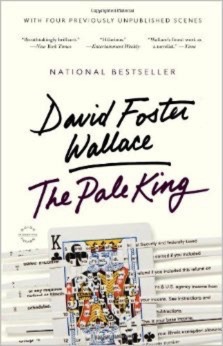
What it seems to me is to be a great course in fiction writing. Because the manuscript is raw and unedited, you get to see Wallace's writing style and how he allows himself to follow tangents and not get too hung up on the overall integrity or theme of the book. Like the sliced up playing card on the cover, the book seems to be a collection of many stories where you can tell that an image is emerging. You even know what the image is. Yet it is obvious that it isn't a single image, but a collection of fragments that seem to hang together.
Other reviews of this book encouraged me to read it. I'm glad I did. I doubt I would have done so without the positive reviews.
You might say it is a strange introduction to David Foster Wallace's writing. On the other hand it may well be his masterpiece, unfinished as it is. I'm not sure that you need a great ending to have a great story. Perhaps the best stories of our lives give us the sense that we might craft the ending in our own imagination.
I know I'll be reading more of Wallace's books in the future.
Canoe Country
05/04/16 18:45
Roy MacGregor, Canoe Country: The Making of Canada, (Toronto: Random House, Canada), 2015.
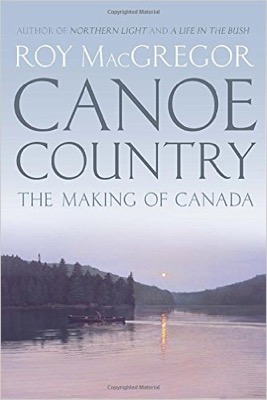
I was taking great delight in reading a book about ideas and concepts that I thoroughly enjoy and was taken by surprise when on Page 225, I read a quote and saw my name as the writer of the quote. The quote has been taken from an entry into an essay contest that I had made a few years ago. My delight was complete! To find a book that was so thoroughly enjoyable written by someone who had enjoyed a quote from an essay I had written enough to pass it on. What an honor! To think that people will years from now continue to read MacGregor's book, it may well be that this quote will become the one bit of my writing that survives the longest. Who knows?
One short quote in a beautifully-crafted book is icing on the cake, but without that quote the book stands as a wonderful way of getting to know more about Canada and about Canoes. This is a book I will recommend to many people. But if you want to read it, you'll have to obtain your own copy. Mine is a treasure that I intend to keep for the rest of my life.
33 Poems
05/04/16 16:12
Robert Lax, 33 Poems, (Stuttgart: Staib & Mayer), 1988 edition.
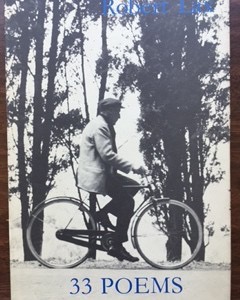
It was a meaningful discipline for Lent this year, however. I found the poems to be surprisingly spiritual in their deep appreciation for some of the simplest parts of life and the complex thoughts that are inspired by a very few words. Mindful of a professor under whom I once studied, who would write on my papers: "Eliminate half of the words and turn it back in." I'm no poet and I am used to generosity when it comes to the number of words in an essay. Lax presents a different, challenging and artful view of the word.
I'm keeping this volume to return to again and again.
The Western Flyer
05/04/16 15:51
Kevin M. Bailey, The Western Flyer: Steinbeck's Boat, the Sea of Cortez, and the Saga of Pacific Fisheries, (Chicago: University of Chicago Press), 2015.
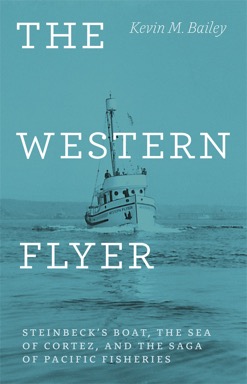
There is a lot about Steinbeck, Ricketts and their scientific explorations and discoveries that does not come through The Log. Bailey's book definitely adds a great deal more to the understanding of what was likely a breakthrough expedition in the story of the developing science of ecology. More than the actual expedition, however, was the remarkable meeting of brilliant minds and expansive thinking as the work of the Biologist Ricketts, the novelist Steinbeck, and the philosopher Joseph Campbell.
This is a great book for Steinbeck fans as well as a book for fans of wooden boats, and also an important volume for ecologists, not for its scientific observations, but rather to put the study of ecosystems into perspective in the scope of American History. The Western Flyer probably wasn't that remarkable as a fishing vessel. Its trawler design with a flying bridge made it particularly well suited, however, for the adventure on which Ricketts and Steinbeck took her. The fact that she remains, though in derelict condition, is a tribute to the strength of her design and construction.
The book is an easy read and a suitable companion for Steinbeck's other writings.
The Log from the Sea of Cortez
04/04/16 08:16
John Steinbeck, The Log from the Sea of Cortez, (New York: Penguin), 1995 edition.
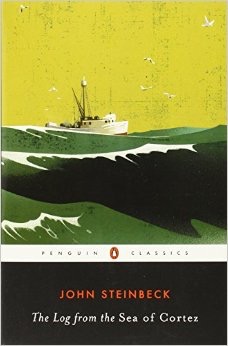
The edition of the book that I read is a later edition which contains Steinbeck's portion of the log and a tribute to Ed Ricketts written by Steinbeck. It was interesting to me to see how much of the basic concepts of interconnectedness that later became principles of ecology was understood by Ricketts and Steinbeck. They could see the effects of the use of water from the Colorado River for agricultural irrigation was altering the life of sea creatures. They understood the impact of factory boat over fishing of particular areas and how it would have world wide consequences.
I picked up the book because I had not previously read it and I was intending to read Kevin Bailey's book about The Western Flyer, which I also will review in this blog. It is a good read and for those who have read it, a good re-read to remind ourselves of how contemporary are the ideas of Steinbeck and Ricketts.